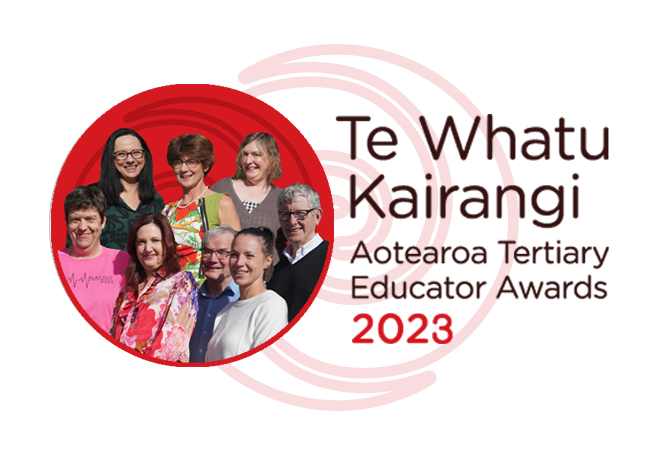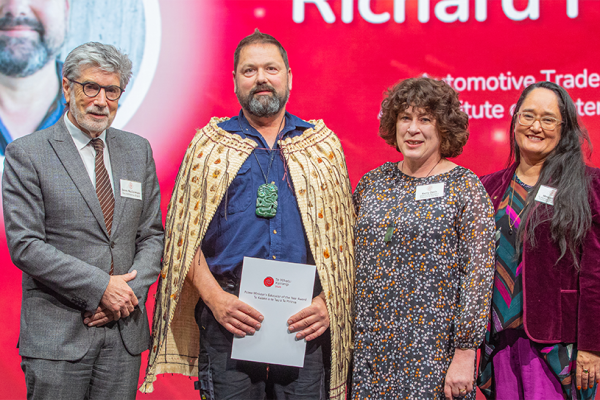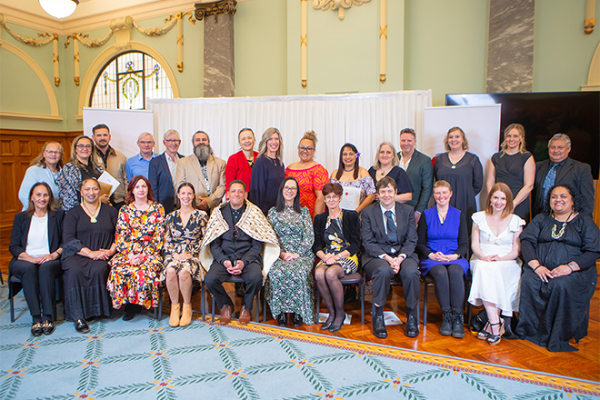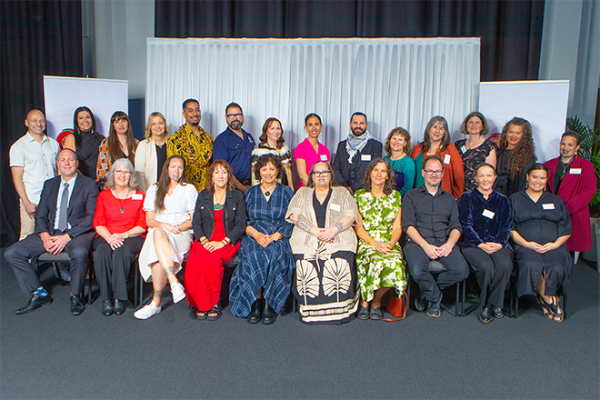Ara | Te Pūkenga – Awanui Collaboration
Educator/Industry partnership that is an exemplar for others
Group Category Winner | Progressing Education Partnerships and Collaboration
Ara Institute of Canterbury | Te Pūkenga and Awanui Group
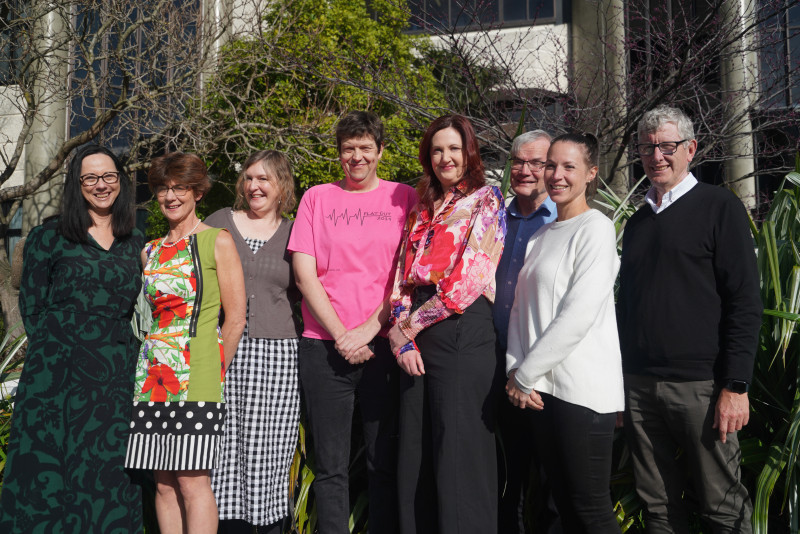
Ara | Te Pūkenga – Awanui Collaboration group members (left to right): Heather Compton, Elaine Rutherford, Marion Hale, Dr Grant Bennett, Tracy Hutton, Derek Chirnside, Clare Hutchinson, and Alan Hoskin.
Watch the Ara | Te Pūkenga – Awanui Collaboration Teaching profile video
In 2018, the Awanui Group approached Ara Institute of Canterbury | Te Pūkenga about the development and delivery of an industry-recognised qualification that would seamlessly integrate online learning with workplace competency training. This would enable Awanui kaimahi to work fulltime while completing a tertiary level qualification relevant to their profession.
Those involved in the partnership included Heather Compton, Learning and Capability Manager for Awanui Group; Alan Hoskin, Marion Hale, and Derek Chirnside, educational developers from Ara; and Grant Bennett, Tracy Hutton, Elaine Rutherford and Clare Hutchinson, managers and kaiako (teachers) from Ara.
Heather wanted the focus to be a collaborative blending of academic skills and professional practice so kaimahi (staff) could understand the “why” behind their work. The team objective was to create a pathway to develop professionally and meet medical and community needs, while looking after and retaining kaimahi for Awanui.
Once implemented, a graduate spoke of the difference between the old process of sitting the exam, and the new programme as, “learning for your career, not for an exam.”
Before this programme, Awanui’s training for employees was not recognised outside their industry, or within the NZQA framework. Awanui found this detrimental to kaimahi development and retention and created risk to the organisation. To solve this, the Ara-Awanui team created a responsive, authentic pathway of learning relevant to their work, and recognised by NZQA and industry.
The Ara-Awanui partnership and the programme’s principles demonstrates alignment with the Tertiary Education Strategy; particularly aligning with TES Objective Four: Future of Learning and Work and TES Objective Two: Barrier Free Access.
The team engaged akōnga (learners) by structuring the programme to make strong connections between their learning, activities, work, and assessments. This constructive alignment places the akōnga at the centre of a learning space that is reflective, focused on continuous improvement, and with scaffolded support (TES Objective One: Learner at the Centre).
Passionate about akōnga success, the team has expertise in science disciplines, as well as extensive teaching experience in the classroom, laboratory, and workplace. Delivery has been supported by a culture of professional reflection using course and akōnga feedback to maintain quality and relevance (TES Objective Three: Quality Teaching and Leadership).
The team designed a programme that scaffolded learning with work-based practice. This included weekly checkpoints and a range of activities to support various learning styles; for example, videos filmed in Awanui laboratories, workbooks, assessments for learning, and other interactive online activities. The team encouraged akōnga to apply theory and practice together in the workplace and reflect on the “why” behind it. The design was enabled by a structure that followed business workflow rather than academic semesters, with five intakes and terms spread across the year.
This approach met the needs of akōnga who were in full time employment, widely distributed geographically and/or from diverse backgrounds, while also meeting the industry’s need for sustainable kaimahi development.
The first cohort of akōnga who graduated from the programme were managers and trainers, allowing Awanui to create a collegial network of mentors across their business. A coordinated ‘Train the Trainer’ approach was also used to support these work-based trainers across the country in their roles to support and engage with their kaimahi.
“Yes, I am now a trainer! I felt more confident after finishing this Diploma, so I took on additional responsibilities.” (Graduate)
The teaching team sees the Awanui kaimahi as active partners in the programme. Frequent feedback is sought through multiple sources and used for reflection. Akōnga comments have been heard by Ara and Awanui to enable positive change and the team at Ara continually evaluate the programme with Awanui and industry.
The Student Experience Survey has shown tremendous improvements with “satisfaction with the programme” rising from 72% to 98% from 2021 to 2022. These results are also borne out by student feedback.
For akōnga, the programme has allowed access to tertiary education where previously there was little opportunity due to family responsibilities, work, and past educational experiences. Akōnga have reported that this has opened opportunities for career advancement within and outside Awanui. The impact has been profound for akōnga.
“I feel it has opened other opportunities for me within Awanui. It gave me more of an understanding of other departments and also an interest in other departments.” (Graduate)
The Ara-Awanui team are excited about the impact the programme is having across New Zealand.
In 2021 the Medical Sciences Council endorsed the accreditation of Ara’s L5 Diploma in Applied Science (Pre-Analytical Technician Pathway), enabling graduates of the pathway to apply to the Council for registration as Pre-Analytical Technicians.
Awanui’s business has been substantively impacted with improved kaimahi retention and development of a critically reflective workforce, confident to take on leadership roles. As a result, Awanui have renewed their MOU with Ara for another five years.
Since 2020, 117 akōnga have graduated, with another 91 currently enrolled.
The team believes that the programme pathway is positioned to continue and thrive. For Awanui, it increases social and financial sustainability by creating a more stable, qualified workforce able to serve its communities. For Ara, the programme is financially sound and aligns with the Te Pūkenga Charter.
For akōnga the programme scaffolds and develops transferable skills leading to career development. Being work-based, the programme is socially sustainable allowing whānau to be financially supported while kaimahi study with support at work.
The collaborative team is proud of the development and delivery of this programme and excited about its impact on akōnga. They have reduced learning barriers, opened the door to further education for some, empowered others to seek challenging leadership roles within Awanui or the wider industry, put simply they are changing people’s lives and creating a sustainable future for education.
